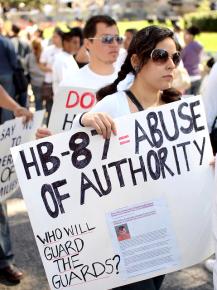Anti-immigrant attack in Ga.
Rallies and school walkouts are signs of renewed confidence among immigrant rights activists to challenge bigoted legislation in Georgia, reports .
MORE THAN 6,000 people gathered in Atlanta March 24 to condemn a series of anti-immigrant laws that passed in the Georgia legislature. The crowd called on Georgia Gov. Nathan Deal to veto HB 87/SB 40, which are even more draconian than Arizona's infamous SB 1070, when they arrive on his desk.
Like SB 1070, these bills would make racial profiling the official business of all Georgia law enforcement. They would also require all employers to use the federal E-Verify system to ensure that their workers have legal status in the U.S. What's more, HB 87 also criminalizes providing "transport" or "aid" to an undocumented person, meaning that driving an undocumented friend to the movies or dinner could trigger criminal charges.
Resistance to this assault is brewing. Not only was this initial rally sizeable, it was followed by a student walkout the next day by 300 students in an Atlanta suburb. The walkout was planned and executed completely by students.
High school senior Brenda Fernandez said that both the school administration and police tried to stand in the way of the protest planning, but students continued organizing despite the threats. This spirit of resistance will no doubt spread across the state as more and more people gain the confidence to fight back.

Georgia is a key state for the immigrant rights struggle. According to the Pew Hispanic Center, Georgia has the seventh-largest undocumented immigrant population in the country--25,000 more undocumented people than Arizona.
This represents a demographic shift that has taken place during the last 10 years. The demand for cheap labor has been very high in the Southeast during this period, especially in the agriculture, construction and service sectors. Of the 12 states with the largest undocumented populations, four are now in the Southeast.
But the economic crisis has led to a collapse in employment in the South, especially in construction. The overall unemployment statistics in the South tend to be higher than the national average. In Georgia, official unemployment is at 10.2 percent, and Georgia politicians have taken the opportunity to shift responsibility for the crisis by openly scapegoating undocumented immigrants.
This struggle has brought to the surface some debates within the immigrant rights movement--in particular a question about the role of business in fighting this legislation. Segments of the movement suggest that Georgia agribusiness and restaurant associations should be the partners of immigrant rights groups in opposing these bills. But the only reason parts of the business community want to stop these bills is because they want to continue to exploit their undocumented workforce. Tempering our demands to maintain a "partnership" with those who are essentially anti-immigrant is political suicide.
The best way forward for the movement is to link arms with the growing student movement in Georgia that is fighting the austerity pushed by state and local politicians, school boards and university administrations. This represents a powerful and largely untapped source of solidarity across the state. ¡El pueblo unido jamás será vencido!


